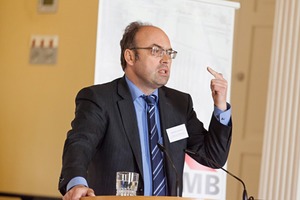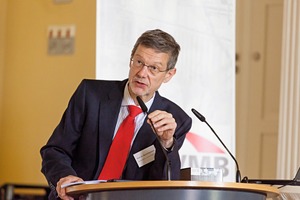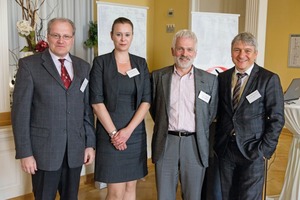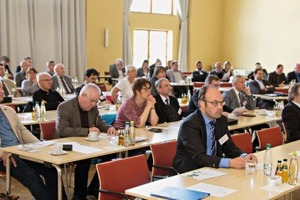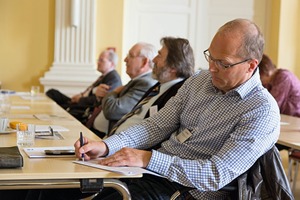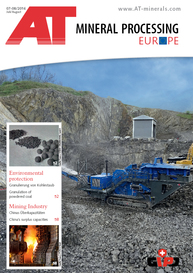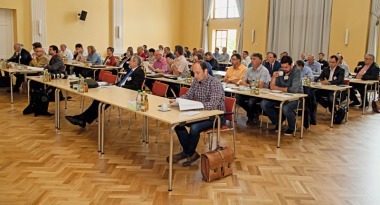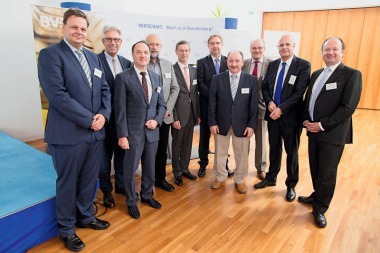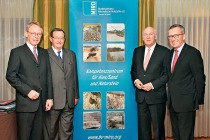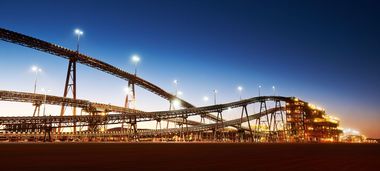15th Raw Material Colloquium in Schönebeck
The demand for stable political general conditions regarding the mining and raw material industries after the state elections in Saxony-Anhalt, the effect of a judgement of the European Court of Justice regarding the water deepening on the raw material industry, the present and future of Thuringia, the judgement of the Leipzig-based Federal Administrative Court regarding the bypass of Naumburg as well as current issues of the standardization of rock size fractions were the main topics of the already 15th Raw Material Colloquium, which took place in Schönebeck/Bad Salzelmen on 3 May 2016. More than 70 representatives of the rock and associated products industry, associations and chambers as well as of mining and environmental administrations had accepted the invitation of the Employers’ Association of the Mineral Building Materials Industry (EAMBMI).
In his opening speech Bert Vulpius, Managing Director of the EAMBMI, underlined the most important topics of the association policy. The associations of the mining and raw material industries could avert the introduction of a statement of the water intake in the Free State of Thuringia. The associations, together with the companies concerned, tried hard to achieve this in the last six months. Finally, the efforts have been successful, and we express our thanks to all who took part in this action, said Vulpius.
The raw material securing in regional planning is one of the main areas in the work of the association. For the time being, many regional plans are in the phase of adjustment in the Central German states. The plans are very important for the planning security of the raw material extracting companies and the securing of a needs-oriented and consumer-oriented supply of mineral raw materials to the economy. First drafts of regional plans show that well-positioned state development plans are no guarantee for a comprehensive raw material securing at the level of planning regions.
Rock and associated products, salt and lignite are the most important local mineral resources of Saxony-Anhalt. For example, this federal state has an outstanding importance for the supraregional raw material supply to the capital region of Berlin and Northern Germany, said Klemens Gutmann, President of the Employers’ and Trade Associations of Saxony-Anhalt with headquarters in Magdeburg. “The long-term extraction of theses mineral resources has a basic importance for this federal state.” As regards the new coalition agreement, the economy would have wished a clearer avowal of the further development and strengthening of Saxony-Anhalt as industrial location.
The main requirements in this respect are a strong economics ministry that supports the demands regarding the raw material extraction, a continuous and reliable area planning, the maintenance of the Federal Mining Act as well as a good technical and staff equipment of the State Office of Geology and Mining.
Prof. Dr. Bernd Dammert from the Leipzig-based bureau of the lawyers Dr. Dammert & Steinforth reported on the judgement of the European Court of Justice as regards the deepening of the river Weser and its effects on the raw material industry. The main statement of the judgement dated 1 July 2015 has considerable consequences for the raw material industry, but also for other industrial planning activities and infrastructure projects. According to the judgement, the member states are obliged, subject to granting an exception, to refuse the permission concerning a concrete project if it leads to a deterioration of the conditions of the surface water. Mining interferes in many ways in the conservation resource ‘water’, if in the form of water intake or inlet, groundwater depletion or generating a water body within the framework of raw material extraction. Furthermore, it should be assumed that the main statements of the judgement might also be referred to the groundwater body. For the time being, there are still many pending questions as regards the practical implementation of the judgement by the federal and state legislation. This includes, for example, that there are no standards of evaluation or testing for “deterioration” or “petty limits”. Furthermore, there is hardly any experience regarding the granting of exceptions. The topic is a highly explosive issue because it cuts Germany as an economic location to the quick. To put it in slightly exaggerated terms, the question is “Deindustrialization or environmentally sound economy - what is the aim of politics?”, continued Dammert.
On 10 February 2016, the Leipzig-based Federal Administrative Court declared the town-planning decision of the regional administrative office of Saxony-Anhalt regarding the construction of the bypass of Naumburg to be illegal, because issues of the mining legislation had not been taken into account adequately during traffic planning. The lawyer Sabrina Nowak from the bureau Hümmerich & Bischoff explained in her lecture the severe shortcomings of considerations, which the court underlined in its judgement. When checking the alternatives regarding the bypass, the regional administrative office had not taken into account adequately the importance of the mine property of the plaintiff, which it deserves according to § 124, paragraph 1 of the mining legislation. The court saw a violation of the optimization rule in favour of the interests of the extraction company. Only if the conflict would not be soluble by an optimization, the traffic installation had basically priority over the extraction of mineral resources.
Thuringia has a wide range of raw materials, which are extracted in 214 companies according to high environmental standards under mining control. This was confirmed by Thomas O. Brand from the Thuringian regional mining office with headquarters in Gera. With about 20 million tons of raw materials for the rock and associated products industry, the branch of mining essentially contributes to the economic development of the free state. In addition to the extraction of raw materials, the mining office significantly accompanied measures of redevelopment mining in the last two decades. Examples of these performances can be seen in Ronneburg on the occasion of the 4th Thuringian Mining Day on 24 and 26 June 2016.
Building products according to standards, such as rock size fractions of sand, gravel and crushed natural stone, are a basic prerequisite for durable und stable buildings and roads. Dipl.-Min. Markus Schumacher, member of the management of the Federal Association of Mineral Raw Materials (MIRO) with headquarters in Duisburg gave a lecture on the complex issue of standardization. In the meantime the 2nd generation of European standards for rock size fractions has been triggered. Basic changes are not expected. Essentially, required adaptations are dealt with. The CE marking and current performance declarations have to be carried out by the manufacturers. “You as manufacturers do not allow that others interfere. If there are any questions, contact your associations”, was the final advice of Schumacher.
$(LEhttp://


